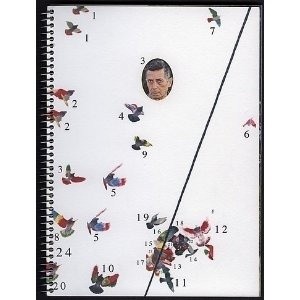Ricardo Cases - Paloma al aire
El tercer libro de Ricardo Cases busca un tema alejado de la actualidad como la práctica de la colombofilia deportiva en el Levante español, un...
Leer más...
El tercer libro de Ricardo Cases busca un tema alejado de la actualidad como la práctica de la colombofilia deportiva en el Levante español, un juego que consiste en soltar una paloma y varias decenas de palomos que vuelan tras ella compitiendo por sus favores. Aunque ninguno de ellos suele llegar a intimar demasiado, vence el que consigue pasar más tiempo cerca de la hembra. No gana el palomo más atlético, el más resistente ni el de raza más pura. Gana el más cortejador, el que más persistencia e instinto reproductor tiene: el más macho. Criar un palomo campeón supone prestigio y ganancias. Pintado con combinaciones de colores primarios, igual que una bandera o un equipo de fútbol, el palomo seleccionado, criado y entrenado para aparearse se convierte en una proyección del palomista, que encarnará ante la comunidad su éxito o fracaso deportivo, económico y sexual. Lejos de sus miserias cotidianas, el colombaire tiene en el universo colombófilo una vida paralela donde puede llegar a lo más alto. Sólo hace falta tener un ave ganadora. El palomista se queda en tierra pero su proyección puede volar. Este trabajo propone un estudio del juego como acto simbólico, como proyección y forma de relacionarnos con el mundo. Un grupo de hombres corriendo por el campo tras sus palomos observando su apareamiento, discutiendo las reglas y los arbitrajes, acto que remite a la documentación etnográfica de ritos de tribus remotas o al grupo de niños que inventan el juego mientras descubren el mundo. Ricardo Cases' third photobook deals with an unusual subject: a unique form of pigeon racing practised in the Spanish regions of Valencia and Murcia. Known as colombiculture, it is a sport with rules and referees.It consists of releasing one female pigeon and dozens of males. Painted in combinations of primary colours, reminiscent of flags or football kits, these pigeons chase the female to get her attention. None ever manage to get too intimate, and consequently the winner is the one that spends the most time close to her. The winner is not necessarily the most athletic, the toughest or the purest in breed but the most courteous, the one that shows most constancy and has the strongest reproductive instinct. This is the one that is seen by aficionados of the sport as the true embodiment of macho'.The pigeon handler invests time, money and hope in his young pigeons. He raises them, gives them names, trains them and has faith in them. When competition day arrives he is full of childlike illusion and uncertainty. The price for young pigeons can reach thousands of euros and betting involves large amounts of money. The male pigeon becomes almost a projection of the pigeon-keeper himself, who embodies its sporting, economic and sexual success or failure in the community. Raising a male champion can bring both prestige and profit. Far from the harsh reality of his daily life, the colombaire has a second life where all is possible he can reach the top. He just needs a champion pigeon.In Paloma al Aire, Ricardo Cases explores the sport as a symbolic act, a projection and a way of relating to the world. It is an ethnographic documentation as groups of men run through the countryside behind their male pigeons, observing their mating performances, discussing the rules and the decisions. It could almost be a study of the rituals of a remote tribe or of a group of children who, in the process of discovering the world, invent a new game.
Autor@: Cases, Ricardo
ISBN: 978-1-907893-13-1
Encuadernación: TB - Tapa blanda
Idioma: Inglés
Agotado
